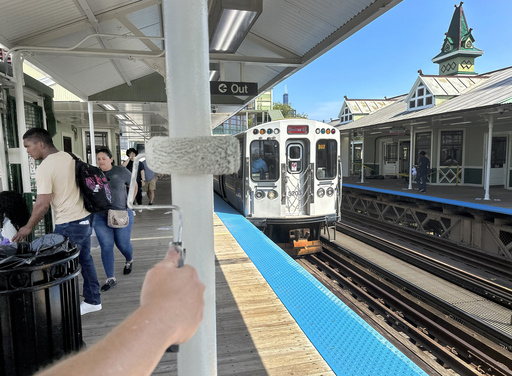Chicago city officials originally planned to reopen a closed elevated train station near the United Center over four years ago, but faced multiple delays, raising doubts about the project’s completion. However, when the Democratic National Committee selected Chicago as the host city for its convention, construction efforts for the Damen green line L stop intensified to ensure it was ready for the delegates’ arrival. The station, located less than half a mile from the Bulls and Blackhawks’ home arena, features unique elements such as wooden ceilings, a colorful mural, and a glass pedestrian walkway offering views of the Chicago skyline, bridging a 1.5-mile gap in service that existed since 1948.
Alderman Walter Burnett, who advocated for the project in his West Side City Council ward, acknowledged the DNC’s role in expediting the station’s completion, emphasizing the impact major events can have on accelerating infrastructure upgrades. While cities may not typically undertake major projects solely to attract political conventions, the desire to impress visitors often leads to hastened construction timelines. Victor Matheson, an economics professor, highlighted that hosting national political conventions often yields overly optimistic economic projections, yet political will can drive cities to expedite existing infrastructure plans to make a favorable impression on guests, even for short events like political conventions.
In previous instances like the 2012 Republican National Convention in Tampa, economic benefits were partly attributed to infrastructure upgrades that were already necessary, indicating a potential exaggeration of the convention’s direct impact. Milwaukee, which hosted recent national conventions without significant public infrastructure investments tied to the events, adjusted the timing of certain projects to accommodate the gatherings. In some cases, agreements with host cities required specific services like the operation of Milwaukee’s streetcar during the Republican National Convention for delegate use.
In Cleveland, preparations for the 2016 Republican National Convention spurred accelerated construction of overdue airport upgrades, a downtown park, and a convention center-attached hotel. The city leveraged the event to showcase its revitalization efforts after years of economic challenges, coinciding with other major sporting events that brought national attention. Despite the focus on transit benefits for local communities during the unveiling of the new L station in Chicago, the station’s completion was acknowledged as timely for the Democratic National Convention, symbolizing the city’s readiness to host global events.
While some expressed disappointment that the convention influenced the project timeline instead of prioritizing routine commuter needs, the opening of the station was still celebrated. Commuters Take Action, an advocacy group for improved transit options, highlighted the significance of the station’s inauguration and encouraged convention visitors to utilize public transportation while advocating for increased national funding. Reflecting on the influence of events like political conventions on public projects, residents expressed mixed feelings, recognizing the benefits while emphasizing the importance of community-driven initiatives in shaping infrastructure developments.
